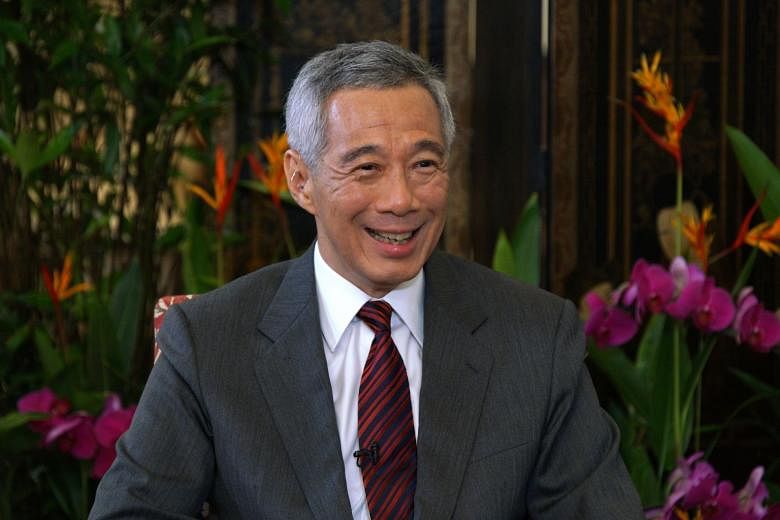BEIJING - Singapore has been working with China at each step of its development, and will continue to ensure that the partnership advances with the times, Prime Minister Lee Hsien Loong said in an interview published on Monday (Sept 18).
Noting that China's transformation has been very fast-paced, Mr Lee laid out how the Singapore-China partnership at the government level has also evolved over the past three decades.
From the Suzhou Industrial Park in the early 1990s which focused on industrialisation, to the Tianjin Eco-city which emphasised sustainable development, Singapore has chosen projects which are meaningful to China and compatible with China's own policy focus and development priorities of the time, he told Xinhuanet ahead of his three-day official visit to China starting Tuesday.
The new Chongqing Connectivity Initiative is also in this vein, with its focus on modern services such as banking and logistics, plugging into China's Belt and Road Initiative (BRI) and its push to develop its western frontier.
He added that a memorandum of understanding that Singapore and China signed in May will spur both sides to deepen collaboration on the BRI to build ports, roads, railways and industrial parks along sea and land trade routes.
For instance, a Chinese company looking to expand into the region can "borrow Singapore's strengths" by setting up a regional headquarters in the island Republic to take advantage of its financial centre, transportation hub, and trade and services facilities, he said.
But Mr Lee also stressed that both countries have much to learn from each other.
-
Other highlights of PM Lee's interview
-
CASHLESS PAYMENTS
On digital payments, Prime Minister Lee Hsien Loong said it has become a convenient alternative to cash for many Chinese, to the point that people now fear their mobile phone batteries running flat over not having money in their wallet. Singapore is not yet at this level, and Mr Lee hopes that China's example will inspire Singapore to move faster on this front.
CHINA'S TRANSFORMATION
Having visited China for more than 30 years, Mr Lee said he has personally witnessed a huge, national change in prosperity. The change is evident in infrastructure such as highways and railways, in telecommunications and Internet access, and also in the people's expectations and outlook. The next five to 10 years will see some challenges, but none that China cannot overcome.
RELATIONS WITH ASEAN
Whether or not trade and economic ties with Asean countries can continue to grow will depend on how the overall relationship develops, said Mr Lee. Trade and cooperation projects will come naturally if ties are good, but should they sour, even mutually beneficial cooperation will take a hit. As Asean chair, Singapore will do its best to promote Asean-China ties, he said.
Besides the training of officials, he cited the Singapore-China Forum on Leadership and the Singapore-China Social Governance Forum as two ongoing platforms that bring officials together to exchange views and experiences, and said these "are never a one-way flow".
China's tremendous growth means that many of its brands and companies such as Taobao, WeChat and Huawei today possess cutting-edge technology that is among the world's best, and Mr Lee said he had personally witnessed how, over the past 30 years, China's prosperity had transformed all of its cities and provinces.
This "national level transformation" has touched many aspects of Chinese society, from highways to telecommunications networks, and has also changed people's lives and outlook, he added.
He cited the cashless payments revolution as one area in which China has moved faster and gone further than any other country, noting that for many Chinese today an empty wallet is less a problem than a phone that has gone flat.
Mr Lee said he had shared the Chinese example in his National Day Rally speech in the hope that it will spur Singapore to do better in its push to become a Smart Nation.
Asked about a key upcoming tender for the Kuala Lumpur-Singapore high-speed rail project, Mr Lee said he hopes to see a Chinese proposal, given China's wealth of expertise and technology accrued in building its own high-speed rail network over the past decade.
Mr Lee said he is sure the Chinese proposal would be of a high quality, and that it would be given "objective and serious consideration".
On his trip, Mr Lee will meet President Xi Jinping, Premier Li Keqiang, who will host a welcome ceremony and dinner banquet in his honour, and top legislator Zhang Dejiang.
He will also travel to Xiamen to meet top officials there, and visit ST Aerospace Technologies (Xiamen) Company and the Fujian (Xiamen)-Singapore Friendship Polyclinic, the first polyclinic jointly set up by Singapore and China in 2011, and attend a commemorative event to mark the completion of the refurbishment of the facade of the OCBC Building.
Accompanying PM Lee are Mrs Lee, Defence Minister Ng Eng Hen, Foreign Minister Vivian Balakrishnan, Finance Minister Heng Swee Keat, Minister in the Prime Minister's Office Chan Chun Sing and Parliamentary Secretary Amrin Amin.


